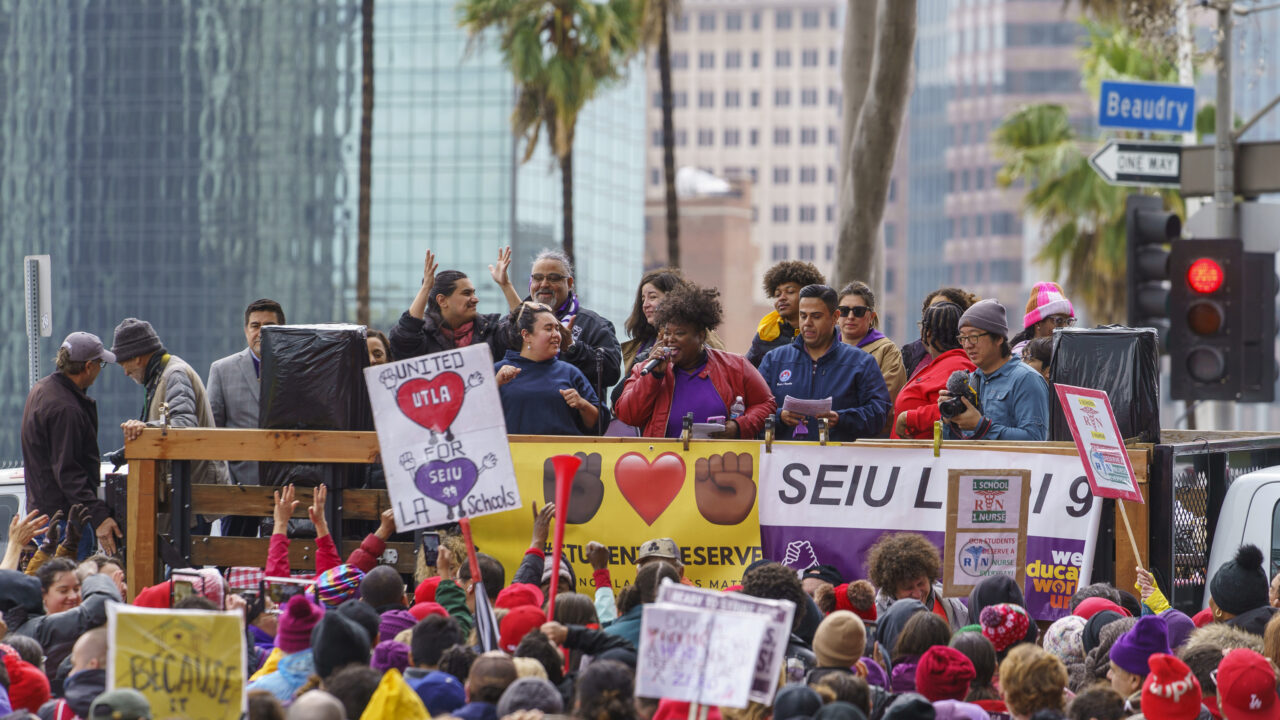Los Angeles Teachers and School Workers Approve Historic Agreement
The new labor agreement includes a thirty percent wage increase and the expansion of health care benefits. Union leaders address thousands of Los Angeles Unified School District teachers and Service Employees International Union 99 members during a rally outside the LAUSD headquarters. Photo: Damian Dovarganes / AP.
Union leaders address thousands of Los Angeles Unified School District teachers and Service Employees International Union 99 members during a rally outside the LAUSD headquarters. Photo: Damian Dovarganes / AP.
Los Angeles Unified School District (LAUSD) workers approved an historic labor agreement last week that would increase wages and include bonus payments, retroactive pay, and fully paid health benefits.
The labor deal follows a three-day strike in March. Roughly 30,000 teacher assistants, cafeteria workers, bus drivers, and other support staff members of Service Employees International Union, Local 99 (SEIU) picketed and rallied at school sites, bus yards, warehouses, and LAUSD headquarters March 21-23.
According to the new agreement, LAUSD workers will receive a 30% wage increase with retroactive pay when the contract is ratified, a $1,000 bonus for employees who worked during the height of the pandemic, the right to file a grievance for claims of harassment, the expansion of fully paid health care benefits for part-time teacher assistants and after school program workers, and more. The contract will be voted on by the LAUSD School Board during its April 18 meeting.
Workers say the wage increase will have the biggest impact on the lives of employees. The last wage increase for support staff employees was signed in July 2020, a few months into the pandemic.
“This 30% is pretty much to try to catch up with everybody else … and that’s huge here in Los Angeles,” said Conrado Guerrero, the President of SEIU Local 99, which represents many of LAUSD’s lowest-paid education workers.
The wage increase breaks down in increments. Employees will receive a 6% increase in wages effective from July 1, 2021, and a 7% increase effective from July 1, 2022, retroactively paid immediately when the contract is ratified. Additionally, they will receive a 7% wage increase effective July 1, 2023, and a $2 per hour increase for all employees beginning January 1, 2024.
When LAUSD support staff went on strike this year, Guerrero said teachers, parents, and support staff showed solidarity.
Haydee Malacas, who has worked as a parent community representative for the school district for 13 years and is on the bargaining unit for the union, said unfair labor practices prompted the strike in March that led to the agreement.
“We knew that if we didn’t reach a deal we would have had to do something else,” she said. “We had so much faith that we weren’t going to give in. They wanted us to. They wanted us to accept whatever they were going to give us.”
LAUSD serves more than 500,000 students, whose schools were shut down for the duration of the strike. A tentative deal was reached on March 24, one day after the strike ended. Union leaders and members thanked Los Angeles Mayor Karen Bass for helping to facilitate negotiations between school district officials and the union.
“If not for her, her leadership, we probably would have left that table a long time ago. And we would have been looking at a whole different situation right now,” Guerrero said.
Malacas, whose husband is on a fixed income, said the agreement will help all employees who work multiple jobs to account for the cost of living in Los Angeles.
“[Mayor Bass] compassionately heard our stories, and she was shocked,” Malacas said. “She was shocked about how understaffed we were, she was shocked [at] the amount of bullying that had occurred to some.”
Guerrero alleged the bullying consisted of members of the district giving union leaders poor evaluations and possible demotions for participating in union activities.
“As Mayor, I have no formal authority over our schools. But that will never stop me when it comes to fighting for our children and their families,” Bass said in a March 24 statement.
This is not the first strike for LAUSD employees. In 2019, LAUSD public school teachers went on a six-day strike halting classes district-wide. When LAUSD support staff went on strike this year, Guerrero said teachers, parents, and support staff showed solidarity.
“A lot of our members are parents themselves, but the ones that are not, they understood why we were out there and [what] we need in order to … stay here to continue to provide the services we do in the communities that we live in,” Guerrero said.
While the strike is an effort to demand respect, Malacas said the wage increase is life changing for employees who only work two or three hours a day, including special education assistants who serve the district’s most vulnerable students.
“Instead of work to live, they can live to work,” Malacas said. The new agreement would increase hours and pay for these workers.
Thousands of support staff employees that emphasized the impact of the agreement.
“Everything that we got, I advocated for,” said Yolanda Mims Reed, a special education assistant for the district who has worked four jobs to stay financially afloat. “We needed the pay increase, we needed the respect, we absolutely demanded our respect to this point. We need more hours. [T]he people need full health care, we need more people working in our district.”
The increase of wages and improved work hours will encourage more people to enter support staff roles to meet the needs of the staffing shortage.
The work itself is what motivates Mims Reed and Malacas to do the work they do each day, even if it means low wages.
“I love the kids. They love me,” Mims Reed said. “I just wouldn’t want to do anything else.”
Malacas said she initially agreed to take on this job to spend more time with her children when they were younger.
“Even my own child said, ‘Why did you take such a low paying job?’ I said, ‘This is my calling. This was important.’ I love being with the kids. I love seeing them grow,” Malacas said.
Staffing shortages, however, have made the job more challenging over the years. According to Mims Reed, a lack of educators has impacted special education significantly.
“Oh my God, we need people so [badly]. Like, beyond the rest of the school, if you ask me,” she said.
As a result of the tentative agreement, the union says that the increase of wages and improved work hours will encourage more people to enter support staff roles to meet the needs of the staffing shortage.
Workers are also determined to continue pushing for fairness in the workplace.
“We still have a lot of items that we’re looking into that need more improvement,” Guerrero said. “The fight continues.”
Your support matters…Independent journalism is under threat and overshadowed by heavily funded mainstream media.
You can help level the playing field. Become a member.
Your tax-deductible contribution keeps us digging beneath the headlines to give you thought-provoking, investigative reporting and analysis that unearths what's really happening- without compromise.
Give today to support our courageous, independent journalists.






You need to be a supporter to comment.
There are currently no responses to this article.
Be the first to respond.